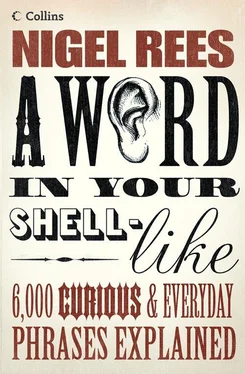1 ...6 7 8 10 11 12 ...30 all of a doodahIn a state of dithering excitement. Known by 1915. From P. G. Wodehouse, Jeeves and the Feudal Spirit , Chap. 14 (1954): ‘A glance was enough to show me that he [Uncle Tom] was all of a doodah.’
all of a tiswasMeaning, ‘confused, in a state’. Known by 1960. This might be from an elaboration of ‘tizz’ or ‘tizzy’ and there may be a hint of ‘dizziness’ trying to get in. But no one really knows. The acronym of ‘Today Is Saturday, Wear A Smile’ seems not to have anything to do with the meaning of the word and to have been imposed later. The acronym-slogan was the apparent reason for the title Tiswas being given to a children’s TV show (UK 1974–82), famous for its buckets-of-water-throwing and general air of mayhem. Broadcast on Saturday mornings, its atmosphere was certainly noisy and confused.
all one’s Christmasses have come at onceWhen one has benefited from lots of luck or been snowed under with gifts. Since the second half of the 20th century?
(to say that) all one’s geese are swansMeaning, ‘to exaggerate or overestimate the worth of one’s children/pupils/anyone dear to one – and to see them in an especially rosy light.’ Burton’s The Anatomy of Melancholy , ‘Democritus to the Reader’ (1621), has ‘All his Geese are swannes’. The actor David Garrick wrote to the Duke of Devonshire about a visit to Milan (1763) and the warmth of his reception by the Governor of Lombardy: ‘You would think, as You Us’d to say to me, that all my Geese were Swans…there was no Civility that I did not receive from him.’ Horace Walpole wrote of Sir Joshua Reynolds (in a letter of 1786): ‘All his own geese are swans, as the swans of others are geese.’
all our yesterdaysFrom Macbeth’s speech in Shakespeare’s Macbeth , V.v.22 (1606): ‘To-morrow, and to-morrow, and to-morrow,/ Creeps in this petty pace from day to day, / To the last syllable of recorded time; / And all our yesterdays have lighted fools / The way to dusty death. Out, out, brief candle! / Life’s but a walking shadow; a poor player,/ That struts and frets his hour upon the stage,/ And then is heard no more: it is a tale/ Told by an idiot, full of sound and fury,/ Signifying nothing.’ This speech has proved a rich source of title phrases. Tomorrow and Tomorrow was a film (US 1932); All Our Yesterdays was the title of Granada TV’s programme (1960–73) devoted to old newsreels and of the actor Edward G. Robinson’s memoirs (1974); The Way to Dusty Death was the title of a 1973 novel by Alastair Maclean; Brief Candles was the title of a collection of short stories (1930) by Aldous Huxley; Told By an Idiot was a 1923 novel by Rose Macaulay; ‘full of sound and fury’ is echoed in the title of William Faulkner’s novel The Sound and The Fury (1929).
all over bar the shoutingAlmost completely over, finished or decided, except for any talking and argument that will not alter the outcome. Said of a contest or event. Of sporting origin, with the shouting, say, the appeal against a referee’s decision in boxing. Known since 1842 (in the form ‘… but the shouting’). Groucho Marx says ‘All over but the shooting’ in The Cocoanuts (US 1929). A Cole Porter song (1937) has the title ‘It’s All Over But the Shouting’. ‘But if the Rhodesia affair is all over bar the shouting, can the same be said about South Africa?’ – Western Morning News (25 September 1976); ‘“He seems to be giving the impression the pay round is all over bar the shouting. He couldn’t be more wrong,” she said’ – The Times (15 May 1995).
all over by ChristmasSee BY CHRISTMAS.
all over the place like a mad woman’s underclothesIn her book Daddy, We Hardly Knew You (1989), the writer Germaine Greer recalls that, when she was growing up in Australia in the 1940s, this was her mother’s phrase to describe an untidy room. In consequence, Greer used The Madwoman’s Underclothes as the title of a collection of her assorted writings (1986). Partridge/Slang does not find this precise expression but in discussing the phrase ‘all over the place like a mad woman’s shit’ points to the euphemistic variants cited by G.A. Wilkes in A Dictionary of Australian Colloquialisms (1978): ‘…like a mad woman’s knitting…custard…lunch box.’ So, Australian it seems to be.
all passion spent‘And calm of mind, all passion spent’ – line 1758 (the last line) of Milton’s dramatic poem Samson Agonistes (1671). Hence, All Passion Spent , the title of a novel (1931) by Vita Sackville-West (a study of ageing and independence in old age). ‘The story of it belongs to a later and final book still to be written: of our hero, ambition laid aside, all passion spent, learning to accept defeat, growing old gracefully’ – Arthur Bryant, Samuel Pepys: The Saviour of the Navy , Preface (1949 edn).
all piss and windEmpty, vacuous – of a man prone to bombast and no achievement, apparently derived from the earlier saying ‘All wind and piss like a barber’s cat’, known by 1800.
all publicity is good publicityA modern proverb dating from at least the 1960s, but probably as old as the public relations industry. Alternative forms include: there’s no such thing as bad publicity; there’s no such thing as over-exposure – only bad exposure; don’t read it – measure it; and I don’t care what the papers say about me as long as they spell my name right. The latter saying has been attributed to the American Tammany leader ‘Big Tim’ Sullivan. CODP includes it in the form ‘Any publicity is good publicity’ and finds no example before 1974. In Dominic Behan’s My Brother Brendan (1965), however, the Irish playwright is quoted as saying, ‘There is no such thing as bad publicity except your own obituary.’ James Agate in Ego 7 (for 19 February 1944) quotes Arnold Bennett as having said, ‘All praise is good,’ and adds: ‘I suppose the same could be said about publicity.’
all quiet on the Western FrontA familiar phrase from military communiqués and newspaper reports on the Allied side in the First World War. Also taken up jocularly by men in the trenches to describe peaceful inactivity. It was used as the title of the English translation of the novel Im Westen nichts Neues [From the Western Front – Nothing to Report] (1929; film US 1930) by the German writer Erich Maria Remarque. The title is ironic – a whole generation was being destroyed while newspapers reported that there was ‘no news in the west’. Partridge/Catch Phrases hears in it echoes of ‘All quiet on the Shipka Pass’ – cartoons of the 1877–8 Russo-Turkish War that Partridge says had a vogue in 1915–6, though he never heard the allusion made himself. For no very good reason, Partridge rules out any connection with the American song ‘All Quiet Along the Potomac’. This, in turn, came from a poem called ‘The Picket Guard’ (1861) by Ethel Lynn Beers, a sarcastic commentary on General Brinton McClellan’s policy of delay at the start of the Civil War. The phrase (alluding to the Potomac River which runs through Washington DC) had been used in reports from McLellan’s Union headquarters and put in Northern newspaper headlines. All quiet along the Potomaccontinues to have some use as a portentous way of saying that nothing is happening.
all right for some!Meaning, ‘some people have all the luck!’ – a good-humoured expression of envy. ‘I’m just off to the West Indies for an all-expenses paid holiday’ – ‘All right for some!’ From the mid-20th century.
Читать дальше












